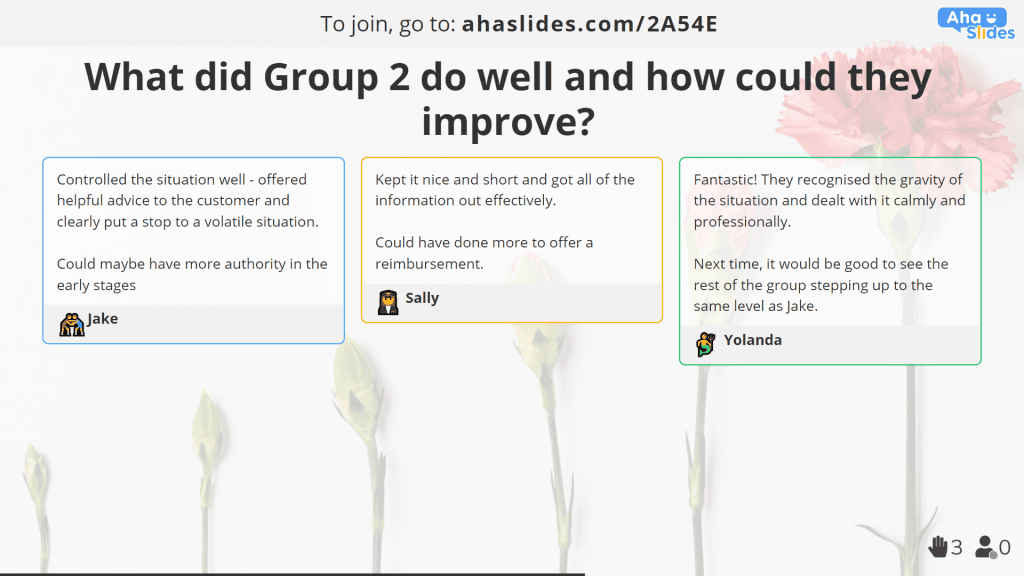मानसिक खुफिया बनाम नेतृत्व में भावनात्मक खुफिया? एक महान नेता के लिए कौन सी बात ज़्यादा महत्वपूर्ण है? 2024 में AhaSlides की सर्वश्रेष्ठ गाइड देखें
इस बारे में एक विवादास्पद तर्क रहा है कि क्या उच्च भावनात्मक बुद्धि वाले नेता उच्च मानसिक बुद्धि वाले नेताओं की तुलना में नेतृत्व और प्रबंधन में बेहतर होते हैं।
यह देखते हुए कि दुनिया के कई महान नेताओं की IQ उच्च है, लेकिन यह गारंटी नहीं है कि EQ के बिना IQ का होना सफल नेतृत्व में योगदान देता है। नेतृत्व में भावनात्मक बुद्धिमत्ता के सार को समझने से प्रबंधन टीम को सही विकल्प चुनने और सही निर्णय लेने में मदद मिल सकती है।
यह लेख न केवल भावनात्मक बुद्धिमत्ता की धारणा को समझाने पर ध्यान केंद्रित करेगा बल्कि नेतृत्व में भावनात्मक बुद्धिमत्ता की भूमिका और इस कौशल का अभ्यास करने के बारे में गहरी अंतर्दृष्टि सीखने के लिए आगे बढ़ेगा।
अवलोकन
| 'भावनात्मक बुद्धिमत्ता' का आविष्कार किसने किया? | डॉ. डेनियल गोलेमैन |
| 'भावनात्मक बुद्धिमत्ता' का आविष्कार कब हुआ? | 1995 |
| 'भावनात्मक बुद्धिमत्ता' शब्द का प्रयोग सर्वप्रथम किसने किया था? | यूएनएच के जॉन डी. मेयर और येल के पीटर सलोवी |
विषय - सूची
- इमोशनल इंटेलिजेंस क्या है?
- आप किस भावनात्मक बुद्धिमत्ता कौशल में अच्छे हैं?
- नेतृत्व में भावनात्मक बुद्धिमत्ता इतनी महत्वपूर्ण क्यों है?
- नेतृत्व में भावनात्मक बुद्धिमत्ता का अभ्यास कैसे करें?
- चाबी छीन लेना
- अक्सर पूछे जाने वाले प्रश्न

AhaSlides के साथ अधिक सुझाव

अपनी टीम को शामिल करने के लिए टूल खोज रहे हैं?
AhaSlides पर एक मजेदार क्विज़ के ज़रिए अपने टीम के सदस्यों को इकट्ठा करें। AhaSlides टेम्पलेट लाइब्रेरी से मुफ़्त क्विज़ लेने के लिए साइन अप करें!
🚀 फ्री क्विज ☁️ लें
इमोशनल इंटेलिजेंस क्या है?
सांवेगिक बुद्धि की धारणा किसके द्वारा लोकप्रिय हुई? डैनियल Goleman 1990 के दशक में लेकिन पहली बार माइकल बेल्डोच द्वारा 1964 के पेपर में उभरा, जो इंगित करता है कि किसी के पास अपनी भावनाओं और दूसरों की भावनाओं को देखने और निगरानी करने की क्षमता है और दूसरों की सोच और व्यवहार का नेतृत्व करने के लिए उनका इस्तेमाल किया।
भावनात्मक रूप से बुद्धिमान नेताओं के उदाहरण
- अपना खुलापन, सम्मान, जिज्ञासा व्यक्त करना और दूसरों को ठेस पहुँचाने के डर के बिना उनकी कहानी और भावनाओं को सक्रिय रूप से सुनना
- उद्देश्यों की सामूहिक समझ विकसित करना और उन्हें प्राप्त करने के लिए एक रणनीतिक योजना बनाना
- उनके कार्यों और गलतियों की जिम्मेदारी लेना
- उत्साह, निश्चितता और आशावाद पैदा करने और प्रोत्साहित करने के साथ-साथ विश्वास और सहयोग का निर्माण करना
- संगठन के परिवर्तन और नवाचार को प्रेरित करने के लिए कई दृष्टिकोणों की पेशकश करना
- निरंतरता संगठनात्मक संस्कृति का निर्माण
- यह जानना कि अपनी भावनाओं को कैसे नियंत्रित किया जाए, विशेषकर क्रोध या निराशा को
आप कौन से भावनात्मक बुद्धिमत्ता कौशल में अच्छे हैं?
“एक नेता को क्या बनाता है” लेख का परिचय देते समय, डैनियल Goleman 5 तत्वों के साथ नेतृत्व में परिभाषित भावनात्मक बुद्धिमत्ता को स्पष्ट रूप से निम्नानुसार समझाया गया है:
1. स्व जागरूकता
अपनी भावनाओं और उनके कारणों के बारे में खुद को जागरूक करना दूसरों की भावनाओं को समझने से पहले पहला कदम है। यह आपकी ताकत और कमजोरियों को समझने की आपकी क्षमता के बारे में भी है। जब आप नेतृत्व की स्थिति में होते हैं, तो आपको पता होना चाहिए कि आपकी कौन सी भावनाएँ आपके कर्मचारियों पर सकारात्मक या नकारात्मक प्रभाव डालेंगी।
# 2। आत्म नियमन
आत्म-नियमन का अर्थ है बदलती परिस्थितियों के अनुसार अपनी भावनाओं को नियंत्रित करना और उन्हें अनुकूल बनाना। इसमें निराशा और असंतोष से उबरकर अपने मूल्यों के अनुकूल कार्य करने की क्षमता शामिल है। एक नेता क्रोध या गुस्से को उचित रूप से नियंत्रित नहीं कर सकता और टीम की प्रभावशीलता की गारंटी नहीं दे सकता। वे सही काम करने के लिए प्रेरित होने की तुलना में गलत काम करने से अधिक डरते हैं। ये दो अलग-अलग कहानियाँ हैं।
#3. सहानुभूति
बहुत से नेता खुद को दूसरे की जगह रखकर नहीं देख सकते, खासकर तब जब वे निर्णय ले रहे हों क्योंकि उन्हें कार्य की पूर्ति और संगठन के लक्ष्यों को सबसे पहले रखना होता है। भावनात्मक रूप से बुद्धिमान नेता आपके द्वारा की जाने वाली किसी भी कार्रवाई और उनके द्वारा लिए गए किसी भी निर्णय के बारे में विचारशील और विचारशील होता है ताकि यह सुनिश्चित किया जा सके कि उनकी टीम में कोई भी व्यक्ति पीछे न छूट जाए या कोई अनुचित समस्या न हो।
# 4। प्रेरणा
जॉन हैनकॉक ने कहा, "व्यवसाय में सबसे बड़ी योग्यता दूसरों के साथ मिलकर काम करना और उनके कार्यों को प्रभावित करना है"। लेकिन आप दूसरों के साथ मिलकर कैसे काम करते हैं और उन्हें कैसे प्रभावित करते हैं? प्रेरणा नेतृत्व में भावनात्मक बुद्धिमत्ता का मूल है। यह न केवल अपने लिए बल्कि अपने अधीनस्थों को भी अपने साथ शामिल होने के लिए प्रोत्साहित करने के लिए अस्पष्ट लेकिन यथार्थवादी लक्ष्यों को प्राप्त करने की प्रबल इच्छा के बारे में है। एक नेता को यह समझना होगा कि कर्मचारियों को क्या प्रेरित करता है।
# 5। सामाजिक कौशल
सामाजिक कौशल दूसरों के साथ व्यवहार करने के बारे में हैं, दूसरे शब्दों में, संबंध प्रबंधन। यह सच लगता है कि "लोगों के साथ व्यवहार करते समय, याद रखें कि आप तर्क के प्राणियों के साथ नहीं, बल्कि भावनाओं के प्राणियों के साथ व्यवहार कर रहे हैं", डेल कार्नेगी ने कहा। सामाजिक कौशल का महान संचारकों से गहरा संबंध है। और वे हमेशा अपने टीम के सदस्यों के लिए व्यवहार और अनुशासन का सबसे अच्छा उदाहरण होते हैं।

नेतृत्व में भावनात्मक बुद्धिमत्ता इतनी महत्वपूर्ण क्यों है?
नेतृत्व में भावनात्मक बुद्धिमत्ता की भूमिका निर्विवाद है। नेतृत्व प्रभावशीलता के लिए भावनात्मक बुद्धिमत्ता का लाभ उठाने के लिए नेताओं और प्रबंधकों के लिए समय सही लगता है। दूसरों को अपने शासन का पालन करने के लिए मजबूर करने के लिए सजा और अधिकार का उपयोग करने का युग अब नहीं है, विशेष रूप से व्यावसायिक नेतृत्व, शैक्षिक प्रशिक्षण, सेवा उद्योग और अन्य में।
इतिहास में भावनात्मक रूप से बुद्धिमान नेतृत्व के कई आदर्श मॉडल हैं जिनका लाखों लोगों पर गहरा प्रभाव पड़ा है और जिन्होंने एक बेहतर दुनिया के लिए प्रयास किया है जैसे मार्टिन लूथर किंग, जूनियर।
वह लोगों को सही और समानता के लिए खड़े होकर उनके साथ जुड़ने के लिए प्रेरित करने और प्रोत्साहित करने के लिए उच्च स्तर की भावनात्मक बुद्धिमत्ता का प्रदर्शन करने के लिए प्रसिद्ध हैं। नेतृत्व में भावनात्मक बुद्धिमत्ता के सबसे विशिष्ट उदाहरणों में से एक के रूप में, मार्टिन लूथर किंग ने अपने श्रोताओं के साथ अपनी सबसे प्रामाणिक भावनाओं और करुणा का संचार करते हुए भविष्य के समान मूल्यों और दृष्टिकोण को साझा करके उनसे जुड़ा।
नेतृत्व में भावनात्मक बुद्धिमत्ता का अंधकारमय पक्ष लोगों की सोच में हेरफेर करने या हानिकारक उद्देश्यों की पूर्ति के लिए नकारात्मक भावनाओं को भड़काने की तकनीक के रूप में इसका उपयोग करना है, जिसका उल्लेख एडम ग्रांट की पुस्तक में भी किया गया है। यदि आप इसका उचित उपयोग नहीं करते हैं तो यह दोधारी तलवार होगी।
नेतृत्व में भावनात्मक बुद्धिमत्ता के उपयोग के सबसे प्रतिष्ठित नकारात्मक उदाहरणों में से एक एडॉल्फ हिटलर है। भावनात्मक बुद्धिमत्ता की शक्ति को जल्द ही महसूस करते हुए, उन्होंने रणनीतिक रूप से भावनाओं को व्यक्त करके लोगों को प्रभावित किया, जिससे व्यक्तित्व पंथ को बढ़ावा मिला और परिणामस्वरूप, उनके अनुयायी “आलोचनात्मक रूप से सोचना बंद कर देते हैं और केवल भाव व्यक्त करते हैं”।
नेतृत्व में भावनात्मक बुद्धिमत्ता का अभ्यास कैसे करें?
प्राइमल लीडरशिप: द हिडन ड्राइवर ऑफ़ ग्रेट परफॉरमेंस में, लेखकों ने भावनात्मक नेतृत्व शैलियों को छह श्रेणियों में विभाजित किया है: आधिकारिक, कोचिंग, संबद्ध, लोकतांत्रिक, गति-निर्धारण और बाध्यकारी (डैनियल गोलेमैन, रिचर्ड बॉयटज़िस और एनी मैककी, 2001)। भावनात्मक नेतृत्व शैलियों का चयन सावधानी से करना चाहिए क्योंकि आप नहीं जानते कि प्रत्येक शैली का उन लोगों की भावना और अंतर्ज्ञान पर कितना प्रभाव पड़ता है जिनका आप नेतृत्व कर रहे हैं।
नेतृत्व में भावनात्मक बुद्धिमत्ता का अभ्यास करने के 5 तरीके यहां दिए गए हैं:
#1। माइंडफुलनेस का अभ्यास करें
आप जो कहते हैं और अपने शब्द उपयोग के बारे में जागरूक रहें। सबसे सचेत और विचारशील तरीके से सोचने का अभ्यास करने से आपको अपनी भावनाओं को प्रबंधित करने और प्रतिक्रिया देने में मदद मिल सकती है। यह आपकी नकारात्मक भावनाओं को कम करने में भी मदद करता है और आपके जलने या अभिभूत होने की संभावना कम होती है। आप दिन के अंत में जर्नल लिखने या अपनी गतिविधि पर विचार करने में समय व्यतीत कर सकते हैं।
# 2। फीडबैक से स्वीकार करें और सीखें
आप अपने कर्मचारियों से बात करने और उनकी बात सुनने के लिए एक आश्चर्यजनक कॉफी या स्नैक सत्र का प्रयास कर सकते हैं जो भावनात्मक जुड़ाव को बढ़ावा दे सकता है। आप यह जानने के लिए एक सर्वेक्षण भी कर सकते हैं कि आपके कर्मचारियों को वास्तव में क्या चाहिए और उन्हें क्या प्रेरित कर सकता है। इस तरह की गहन बातचीत और सर्वेक्षण के बाद बहुत सारी मूल्यवान जानकारी मिलती है। जैसा कि आप उच्च भावनात्मक बुद्धिमत्ता वाले प्रसिद्ध नेताओं से देख सकते हैं, ईमानदार और उच्च-गुणवत्ता वाली बातचीत आपकी टीम से प्रतिक्रिया प्राप्त करने का सबसे अच्छा तरीका है। प्रतिक्रिया जो कहती है उसे स्वीकार करें चाहे वह सकारात्मक हो या नकारात्मक और जब आप इस प्रतिक्रिया को देखते हैं तो अपनी नाराजगी या उत्साह को नियंत्रित करने का अभ्यास करें। उन्हें अपने निर्णय को प्रभावित न करने दें।

#3। बॉडी लैंग्वेज के बारे में जानें
यदि आप अपना समय और प्रयास शरीर की भाषा की दुनिया में गहरी अंतर्दृष्टि सीखने में लगाते हैं तो यह कभी बेकार नहीं जाता। दूसरों के मूड को पहचानने का इससे बेहतर तरीका कोई नहीं है कि उनकी शारीरिक भाषा को देखा जाए। खास हाव-भाव, आवाज़ की टोन और आँखों पर नियंत्रण, ... उनकी वास्तविक सोच और भावनाओं को प्रकट कर सकते हैं। उनके कार्यों में किसी भी विवरण को कभी नज़रअंदाज़ न करना आपको सच्ची भावनाओं का बेहतर अनुमान लगाने और जल्दी और उचित तरीके से उनका जवाब देने में मदद कर सकता है।
# 4। भत्तों और सजा के बारे में जानें
यदि आप सोच रहे हैं कि कर्मचारियों को प्रेरित करने के लिए किस प्रकार का अनुलाभ या दंड बेहतर काम करता है, तो ध्यान रखें कि आप सिरके की तुलना में शहद के साथ अधिक मक्खियाँ पकड़ते हैं। यह कहीं न कहीं सच है कि कई कर्मचारी अपने प्रबंधक से प्रशंसा सुनना पसंद करते हैं जब वे कोई अच्छा काम करते हैं या कोई उपलब्धि अर्जित करते हैं, और वे बेहतर प्रदर्शन करना जारी रखेंगे।
ऐसा कहा जाता है कि लगभग 58% नौकरी की सफलता भावनात्मक बुद्धिमत्ता पर आधारित होती है। सजा कुछ मामलों में आवश्यक है, खासकर जब आप समानता और विश्वास बनाए रखना चाहते हैं और संघर्षों को रोकना चाहते हैं।
# 5। एक ऑनलाइन पाठ्यक्रम या प्रशिक्षण लें
यदि आप कभी इसका सामना नहीं करते हैं तो आप इसे कभी नहीं जान पाएंगे कि इसे कैसे हल किया जाए। भावनात्मक बुद्धिमत्ता में सुधार के लिए प्रशिक्षण या पाठ्यक्रम में शामिल होना आवश्यक है। आप उस प्रशिक्षण पर विचार कर सकते हैं जो आपको कर्मचारियों के साथ जुड़ने और लचीले परिदृश्यों का अभ्यास करने का मौका देता है। आप प्रशिक्षण सत्रों के दौरान संघर्षों को हल करने के विभिन्न तरीके भी सीख सकते हैं।
इसके अलावा, आप सहानुभूति को पोषित करने और दूसरों की बेहतर समझ को बढ़ावा देने के लिए विभिन्न टीम-निर्माण गतिविधियों के साथ अपने कर्मचारी के लिए व्यापक भावनात्मक खुफिया प्रशिक्षण तैयार कर सकते हैं। इसके द्वारा, आपको गेम खेलने के दौरान उनके कार्यों, व्यवहारों और व्यवहारों को देखने का मौका मिल सकता है।
चाबी छीन लेना
तो आप किस तरह के नेता बनना चाहते हैं? मूल रूप से, नेतृत्व में भावनात्मक बुद्धिमत्ता का उपयोग करने का कोई सही या गलत तरीका नहीं है क्योंकि ज्यादातर चीजें एक ही सिक्के के दो पहलू की तरह काम करती हैं। अल्पकालिक और दीर्घकालिक दोनों लक्ष्यों की खोज में, नेताओं के लिए यह आवश्यक है कि वे स्वयं को भावनात्मक बुद्धिमत्ता कौशल से लैस करने पर विचार करें।
कोई फर्क नहीं पड़ता कि आप किस प्रकार की नेतृत्व शैली का अभ्यास करना चुनते हैं, अहास्लाइड्स बेहतर टीम प्रभावशीलता और सामंजस्य के लिए कर्मचारियों को प्रशिक्षण और आकर्षक कर्मचारियों में सहायता करने के लिए उचित रूप से सर्वोत्तम शैक्षिक और प्रशिक्षण उपकरण। कोशिश अहास्लाइड्स अपनी टीम के प्रदर्शन को बढ़ावा देने के लिए तुरंत कदम उठाएं।
अक्सर पूछे जाने वाले प्रश्न
इमोशनल इंटेलिजेंस क्या है?
भावनात्मक बुद्धिमत्ता (ईआई) से तात्पर्य किसी की अपनी भावनाओं को पहचानने, समझने और प्रबंधित करने की क्षमता से है, साथ ही दूसरों की भावनाओं को प्रभावी ढंग से नेविगेट करने और उनका जवाब देने की क्षमता से है। इसमें भावनात्मक जागरूकता, सहानुभूति, आत्म-नियमन और सामाजिक संपर्क से संबंधित कौशल का एक सेट शामिल है। इसलिए, यह नेतृत्व की स्थिति में एक अत्यंत महत्वपूर्ण कौशल है।
भावनात्मक बुद्धिमत्ता कितने प्रकार की होती है?
पाँच अलग-अलग श्रेणियाँ हैं: आंतरिक प्रेरणा, आत्म-नियमन, आत्म-जागरूकता, सहानुभूति और सामाजिक जागरूकता।
भावनात्मक बुद्धिमत्ता के तीन स्तर क्या हैं?
तीन स्तरों में आश्रित, स्वायत्त और सहयोगात्मक शामिल हैं।








